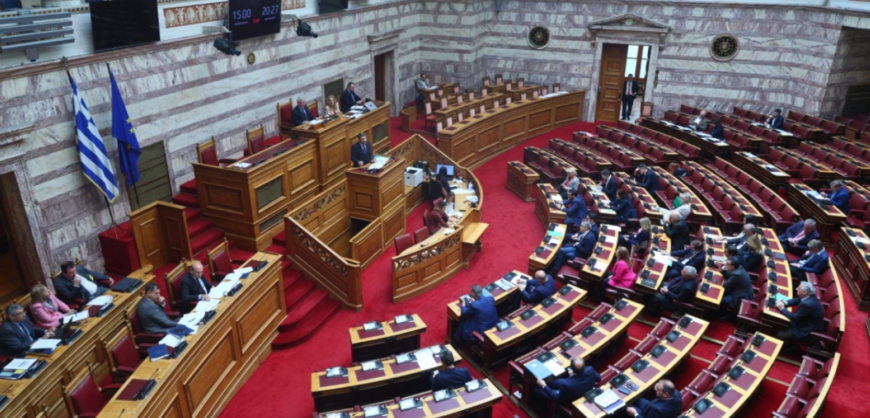The bill for ‘Public Health Actions – Regulations for the Strengthening of the National Health System’ was introduced for discussion and voting in the plenary session. The bill introduces regulations for the implementation of the national action plan for public health, the conditions for private practice of doctors in the National Health System (NHS), prescription of drugs, the recovery mechanism, the National Public Health Organisation, the National Health Services Organisation, the National Central Health Procurement Authority, and the Panhellenic Medical Association, NHS hospitals, Health Regions, and Health Centers, and medically assisted reproduction.
During the drafting of the bill in the relevant parliamentary committee, New Democracy expressed support for the principle. It was voted against by SYRIZA, KKE, New Left, and ‘Victory’ party. PASOK, Greek Solution, Spartans, and Freedom Path have reserved their final stance in the plenary.
Employment status for doctors and nurses of the NHS
The bill introduces a series of regulations for doctors and nurses of the NHS. The focus is on the regulations amending the terms and conditions for the private practice of doctors in the NHS sector. Specifically, the bill:
– It introduces the exceptional possibility for NHS doctors to engage in private practice in the medical field, provided they participate in the full-time, beyond regular working hours, operation and on-call duties of the hospital. According to the explanatory memorandum, this exceptional opportunity for doctors, through their employment in the private sector of healthcare, is provided both to utilise their clinical experience and to enhance their income. It is expected to attract more doctors to the public healthcare system, as they will be able to combine employment in the private healthcare sector. Private practice is allowed upon submission of a relevant application and reasoned approval by the competent authority, provided that it does not disturb, alter, or violate in any way the smooth operation (regular working hours, on-call duties, full-time operation) of hospitals. Furthermore, through restrictions, clauses, and procedural terms, which are specified by decision of the Minister of Health, the smooth operation of public hospitals is ensured.
– Also, it provides for the extension until December 31, 2025, of the stay of those doctors in the NHS sector whose stay had been extended until March 31, 2024, to continue to offer their valuable experience and not to disrupt the smooth operation of healthcare structures. Additionally, for the sake of equal treatment, the possibility of staying until December 31, 2025, is provided for doctors whose employment contract ended on December 31, 2023, and whose contract was extended until December 31, 2024.
– Additionally, it extends the legal exemption from the obligation of rural service for those doctors who entered Medical School until the academic year 2012-2013. Since most of them have already fulfilled the rural service obligation, the proposed provision facilitates the last ones in accessing specialisation training and appointment to the NHS, without jeopardising the smooth operation of healthcare structures staffed by doctors obliged to rural service.
– It includes the specialisation for dentistry, the unified process of placement for doctors, dentists, and other healthcare professionals to acquire specialisation and clarifies technically the way of predicting the positions of trainees in the Ministry of Health’s budget.
– Moreover, it regulates the inclusion in Article 29 of Law 4958/2022 of those doctors who, at the beginning of its validity, were practising in the speciality of anaesthesia, while having interrupted practice in another specialisation. Specifically, the proposed provision stipulates that the aforementioned anaesthesiology trainees will be compensated for the entire period required for practice in anaesthesiology, excluding the period during which they practised in another medical specialisation.
Alzheimer’s Is Becoming More Prevalent (infographic)
– As well it includes the income of NHS doctors and university doctors from their afternoon work and those resulting from the full-day operation of hospitals, from performing surgical operations or other procedures requiring hospital stay beyond daily hospitalisation, and are taxed according to para. b) of para. 2 of article 7 of the Income Tax Code (Law 4172/2013
National Health
The draft law also introduces regulations related to the implementation of the national action plan for public health.
Specifically
The bill introduces a unified framework for breast cancer screening in women aged 45 to 74. This provision modifies Article 24 of Law 4917/2022, under which the project “Preventive Diagnostic Examinations for Breast Cancer” was implemented, funded by resources from the National Recovery and Resilience Plan. Breast cancer is the most commonly diagnosed cancer in 27 EU countries and the leading cause of cancer death in women. By establishing a unified framework for universal population-based pre-symptomatic screening in women aged 45-74, it is expected to increase the detection rates of breast cancer at an early stage, leading to improved rates of curable mortality and increased life expectancy of the population.
Legislative regulation implements the project “Child and Family Health Promotion,” funded by resources from the National Recovery and Resilience Plan. According to the definitions of the World Health Organisation, physical and mental health are interrelated concepts that can be effectively enhanced through public health interventions at multiple levels and areas of human activity. The introduced regulation intervenes at various stages of child development, from infancy (with actions to strengthen parenting skills and early detection of developmental disorders in children), adolescence (with actions to promote the health of adolescent girls in relation to menstruation), and adulthood (with actions to create and operate a model community center for education, awareness, and therapeutic intervention regarding the phenomenon of non-suicidal self-injury in young people aged 18-24).
Mobile primary health care units under Law 2071/1992 participate in the effective implementation of public health programs of the National Program “SPIROS DOXIADIS,” which includes, among others, the project “Preventive Diagnostic Tests – Mobile Mammography Units.” In this context, regarding the latter project, access to women residing in remote and inaccessible areas will be facilitated, and it is expected that the rates of early detection of breast cancer will increase, aiming for timely intervention.

































